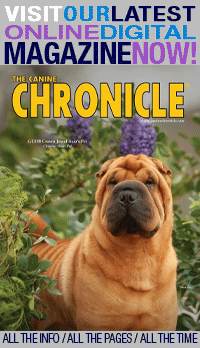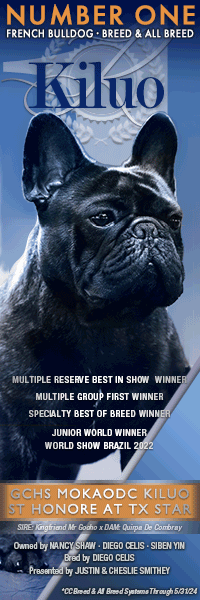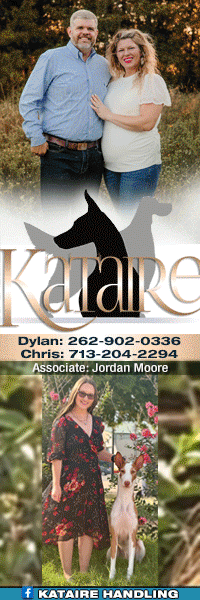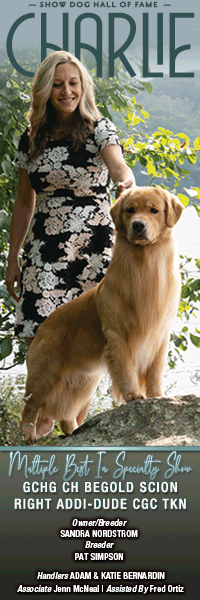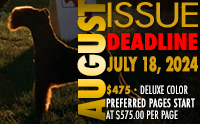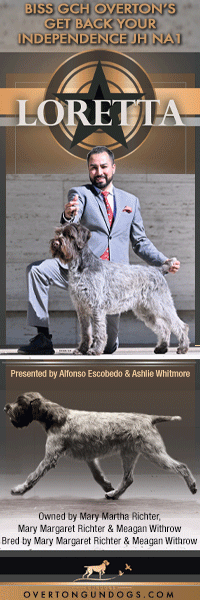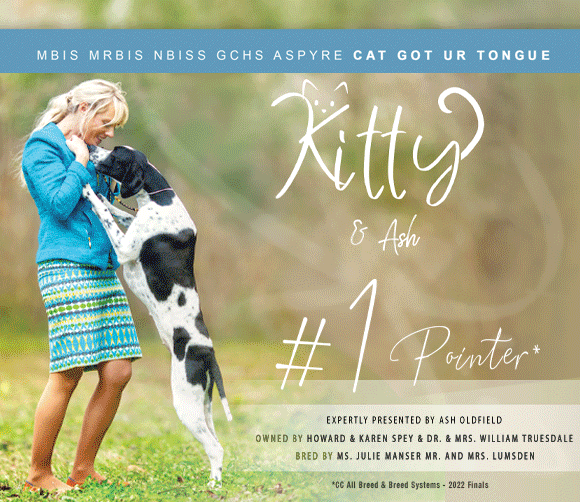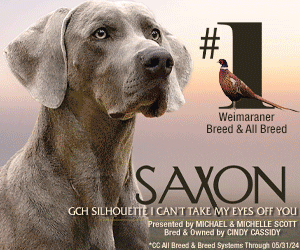From The CC Vault: Growing in the Sport
By Dr. Gerry G. Meisels
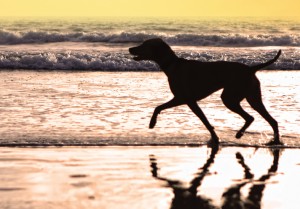 This is a very personal story. I don’t usually write about Sylvia and me, but the subject of this article jumped into my head last night as I was sitting at the monthly meeting of the all-breed club of which I have been a member for 26 years. I have served this club in several positions, as show chair, judges’ hospitality chair, secretary, president, vice president and long-term delegate to the American Kennel Club. Many members of this club have become friends. I enjoy the energy of the younger ones, and the mutually respectful interactions that are surprisingly free of personal tensions and personality conflicts. But when I say younger ones, I stumble a little because most of those younger ones are in their fifties or more. Almost all are active in the club, as club officers and directors, or as show or committee chair. The membership is now quite a bit smaller than when we joined the club, and number of members able to do the physical work that comes with a show is notably limited. We are among them. Neither my wife, Sylvia, or I are able to stay on our feet very long, let alone all day, and even at home we must hire people to do work we once did ourselves with gusto. The show chair made a comment that he needed reliable workers but that there were several unfilled jobs. In the same breath followed a tactful reference to those who no longer had the physical strength to do much of the work but made contributions in other ways. There was a wave of exclamations, “that’s me”. Eventually we all understood that much that was once done by members must now be contracted out. To meet the added expense, clubs must either raise entry fees or find other sources of revenue. That is what started me thinking about shows in general and ourselves specifically, and the distinct “maturing” points in our life in the sport.
This is a very personal story. I don’t usually write about Sylvia and me, but the subject of this article jumped into my head last night as I was sitting at the monthly meeting of the all-breed club of which I have been a member for 26 years. I have served this club in several positions, as show chair, judges’ hospitality chair, secretary, president, vice president and long-term delegate to the American Kennel Club. Many members of this club have become friends. I enjoy the energy of the younger ones, and the mutually respectful interactions that are surprisingly free of personal tensions and personality conflicts. But when I say younger ones, I stumble a little because most of those younger ones are in their fifties or more. Almost all are active in the club, as club officers and directors, or as show or committee chair. The membership is now quite a bit smaller than when we joined the club, and number of members able to do the physical work that comes with a show is notably limited. We are among them. Neither my wife, Sylvia, or I are able to stay on our feet very long, let alone all day, and even at home we must hire people to do work we once did ourselves with gusto. The show chair made a comment that he needed reliable workers but that there were several unfilled jobs. In the same breath followed a tactful reference to those who no longer had the physical strength to do much of the work but made contributions in other ways. There was a wave of exclamations, “that’s me”. Eventually we all understood that much that was once done by members must now be contracted out. To meet the added expense, clubs must either raise entry fees or find other sources of revenue. That is what started me thinking about shows in general and ourselves specifically, and the distinct “maturing” points in our life in the sport.
Two years after we started showing actively, I joined the parent club. It provided a simple mimeographed monthly newsletter that often contained insightful and analytical articles by Jack Marvin, a respected breeder and judge. It drew us to the Montgomery County Terrier show, where our national specialty was held. It was a feast for my eyes as I saw the cream of the crop of Westies, not just those at my local shows. It also helped me make contact with people who were very helpful to a novice; some became friends I would later see only once or twice a year. Shortly thereafter we moved to Texas and one of the Houston Kennel Club members asked us whether we want to join the club, and we did.
I became active in that club. I stewarded at our show, as all club members did. I was chair of the advertising committee and eventually was elected to the Board. There were at least two major maturing points then: first, as a steward I learned procedure but more importantly, how the judging process worked. As director and a member of the show committee, I learned a lot more about the complexity of putting on a show, the reasonable and unreasonable complaints, and the distribution of expenses and revenues. That was a significant, second maturing point.
After we moved to Lincoln, Nebraska, I became involved even more, and eventually served as show chair and president. Partly because the two linked shows (Lincoln and Omaha) were near the end of the year, we drew entries of over 2,000 dogs. While I didn’t learn much more about shows, I learned a lot about how to work with club members. I also began to understand that putting on shows involved groups with different objectives. These include: breeder-exhibitors, vendors, professional handlers (there were fewer then), judges, superintendents, venue, staff, etc. A big “aha” moment for me was that at that time entry fees were the only significant revenue source, and there were three major cost categories: judges, the superintendent, and venue rental. My understanding of the sport grew a great deal, making it maturing point number three.
We came to Florida 27 years ago. Our conformation show working pattern remained unchanged. Just as in Houston and Lincoln, we joined all-breed clubs. Until very recently, we groomed and showed our Westies ourselves. We took pride in our wins and finishing our Westies from the BBE classes. We bemoaned along with so many other breeder-exhibitors the disproportionate winning done by professional handlers. About two years ago it became increasingly difficult for me to get around the ring, kneel down, and get up again. But conformation shows were in our blood, and we had both puppies and mature dogs that were very much worthy of getting into the ring. The solution, of course, was to turn to a professional handler to do what we could no longer do. Maturing came with that, too, as we began to understand why people turn to handlers. There was an additional outcome: watching our handler made us realize that he was more disciplined in show preparation and after-show care than we had been. After a few months, we also realized that he had put our dog in much better condition, and that he consistently showed better for him as well. Our respect for truly professional handlers grew substantially. We also came to recognize that in the groups, presentation and showmanship are essential. I emphasize the “truly professional” because there are a fair number of people whose handling is restricted to taking someone else’s dog in the ring for money. We grew again in our understanding that there are good reasons why some handlers seem to win disproportionately.
This is a long story. When I read stories of this kind I always say to myself: nice, I learned something about the writer, but is there anything in the story that is relevant to me, that will help guide my own actions? What are the lesson learned if any?
It seems to me that this story leads to three recommendations.
First, if you really love showing your dog, then join your national breed club, your local breed club, and an all-breed club, and then get involved in club work. In all-breed clubs you will learn a great deal about the complexities and costs of putting on the shows you enjoy. You will enjoy the companionship of likeminded people and some of them will become your friends. You will also feel the satisfaction of having had a hand in enabling the show. I have already mentioned the value of joining the parent club, but if there is a local breed specialty club, joining it as well will be really helpful as you get to understand your standard better, learn how to groom your dogs better if you have a coated breed, and better prepare your dog for the ring.
Second, broaden your perspective by staying for the groups, watching other breeds, and reading other standards – at least in your own group. You will develop a much better understanding of your own breed and realize that the content of standards falls into two categories: 1. breed type, and 2. structure and movement. The latter are similar in many breeds. You will move a step ahead of many others who come to ringside 15 minutes before show time, and if they do not win the breed, leave and go home or their hotel 15 minutes after judging is over. Most such exhibitors never develop an eye for dogs in their breed, let alone those in other breeds.
Third, make your life at the shows about more than winning. Enjoy the satisfaction of presenting your dog yourself, especially if you bred the dog, and savor the relationship that develops with your dog. If your dog is with a handler, enjoy the reports of his wins with your dog and, if appropriate, the rating the dog has achieved. Enjoy the relationship with people who understand and share your love and commitment to dogs and your interest in conformation. Enjoy your budding friendships with club officers, judges, stewards, vendors, superintendents, and the AKC field executive. Do not forget to add professional handlers to those groups. Most of them will help you and answer questions, especially on grooming. And who knows, some day you may want to hire one when you can’t show yourself.
Finally, your life in dogs will not be complete until you have gone beyond your own dog and your own breed and have become a cog in the complex machinery of the conformation show environment.
Short URL: http://caninechronicle.com/?p=256646
Comments are closed
